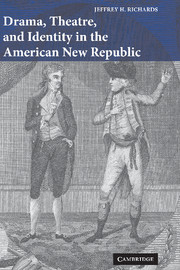Book contents
- Frontmatter
- Contents
- Acknowledgements
- Introduction
- 1 American identities and the transatlantic stage
- PART I Staging revolution at the margins of celebration
- 2 Revolution and unnatural identity in Crèvecoeur's “Landscapes”
- 3 British author, American text: The Poor Soldier in the new republic
- 4 American author, British source: writing revolution in Murray's Traveller Returned
- 5 Patriotic interrogations: committees of safety in early American drama
- 6 Dunlap's queer André: versions of revolution and manhood
- PART II Coloring identities: race, religion, and the exotic
- PART III Theatre, culture, and reflected identity
- Notes
- Bibliography
- Index
5 - Patriotic interrogations: committees of safety in early American drama
Published online by Cambridge University Press: 22 September 2009
- Frontmatter
- Contents
- Acknowledgements
- Introduction
- 1 American identities and the transatlantic stage
- PART I Staging revolution at the margins of celebration
- 2 Revolution and unnatural identity in Crèvecoeur's “Landscapes”
- 3 British author, American text: The Poor Soldier in the new republic
- 4 American author, British source: writing revolution in Murray's Traveller Returned
- 5 Patriotic interrogations: committees of safety in early American drama
- 6 Dunlap's queer André: versions of revolution and manhood
- PART II Coloring identities: race, religion, and the exotic
- PART III Theatre, culture, and reflected identity
- Notes
- Bibliography
- Index
Summary
Although american theatrical managers preferred to stage such demonstrable British favorites as The Poor Soldier and The West Indian to anything by an American author, playwrights in the United States recognized more readily than their transatlantic counterparts the dramatic potential of Revolutionary life. Either because of personal suffering or an acute eye for the marked change in social interactions as a result of the polarizing politics from 1775 onward, a few writers offered much darker assessments of republican life than, say, Royall Tyler in his generally affirmative The Contrast, assessments that asked serious questions about precisely who had control not only over social and political structures but also over personal life. As has been observed above, both Michel de Crèvecoeur and Judith Sargent Murray examine fractured domestic relationships brought about by the politics of separation, with one seeing only ruin, the other positing reconciliation as the outcome of a completed war. Yet in both plays, the writers leave a number of questions unanswered, especially about the larger implications of reconceived patterns of patriarchy, deference, and participation of previously subordinated or marginalized groups.
One of the questions the plays pose has to do with the legitimacy of popular, rather than elite, authority to prosecute public affairs. When the Continental Congress convened in 1774, it established the Continental Association, an agreement among the colonies not to import British goods. To enforce the policies of the Association, local bodies were formed called Committees of Safety.
- Type
- Chapter
- Information
- Drama, Theatre, and Identity in the American New Republic , pp. 105 - 123Publisher: Cambridge University PressPrint publication year: 2005



